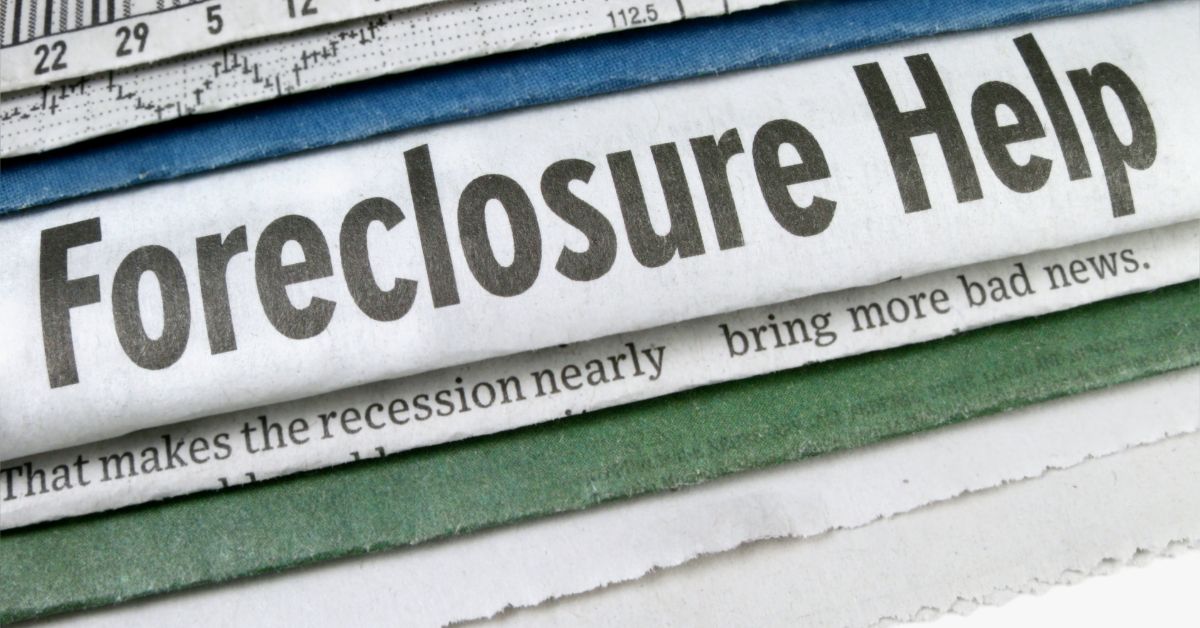Homeowners in default and investors looking to pick up preforeclosure homes often wonder, 'how many late payments before foreclosure.' For investors, knowing how long the foreclosure process takes is essential because it gives them an idea of how long they have to work out a deal that benefits them and homeowners with properties in distress.
This timeframe gives homeowners a better idea of how long they have to remedy their loan or move to a new home. No matter what your position is, this is valuable information. So, we created a guide that gives an overview of the process, timeframes, variables that affect how long the foreclosure process takes, and solutions for getting out of foreclosure.
Foreclosure is the legal or otherwise process that a bank initiates when a property owner is in default to repossess a home. In some areas, there are judicial and non-judicial foreclosures.
A judicial foreclosure goes through the court system. A judge issues a default judgment, and the court schedules the property for a foreclosure auction. In cases with an individual lender or the borrower who signed a Deed of Trust at closing that did not cover foreclosures, lenders must file for a foreclosure judgment in their local court. The legal foreclosure may take weeks or months longer than a non-judicial process. However, it depends on the state regulations.
Lenders always have to follow federal laws governing the foreclosure process. For example, a lender cannot foreclose on a borrower until the mortgage account is more than 120 days past due. If the federal government were to issue a foreclosure moratorium, it would not matter the home's state. The mortgage company would not be able to foreclose until the federal government lifts it.
After that, state laws govern foreclosure. In many states, judicial foreclosures are only a requirement in certain situations when a foreclosure clause or verbiage was not included in the Deed of Trust.
National lenders generally use standard mortgage documents that include this clause. So, in states where non-judicial foreclosures are allowable, many lenders take advantage because it saves them time and money.
Regardless of whether your state allows non-judicial foreclosures, there is a process lenders must adhere to in all foreclosures. Several federal laws govern the foreclosure process. The main federal regulation limits lenders from proceeding with foreclosures until the mortgage account is more than 120 days past due.
Larger lenders are pretty good about working with borrowers and following federal regulations. However, the process will likely be much different if you borrow from a smaller lender or individual. Typically, these lenders must go through the judicial foreclosure process in states that allow both types, which offers some protection for borrowers.
Borrowers are wise to educate themselves on the laws that govern foreclosures in their state. Predatory lenders may take advantage of borrowers who do not know their rights.
Sadly, if homes sell, mortgage companies are more likely to move quickly with foreclosure. If many homes are in inventory in a given market, the mortgage company will likely move slower because holding properties is expensive. As long as the borrower is in possession, even if they are in default, they are legally responsible for the cost of maintaining the property as well as paying HOA dues and taxes.
Foreclosure timelines vary on a case-by-case basis. However, there is a general timeline that all foreclosures must follow.

Lenders give all borrowers a 15-day grace period to pay without reporting a late payment to credit bureaus. In most cases, if a borrower makes their payment within 30-days of the due date, the late payment is not reported.
When a loan reaches 30 to 60 days past due, it defaults. At this time, the lender will notify the borrower that the loan is in default and what action the lender plans to take should the borrower not bring the account current. That letter should give a specific timeframe and instructions for remedying the loan and any assistance the lender offers.
During the preforeclosure period, the borrower still has time to pay the back owed mortgage payments or seek a mortgage modification or other assistance. The preforeclosure period lasts from when the loan goes into default until the foreclosure is filed.
After the lender waits the 120 days required by federal law, they can proceed with the foreclosure as long as there are no other state waiting periods the lender must follow. However, in most states, the waiting period is shorter than the federal law.
If the state requires a judicial process, the lender files the documents initiating the process. They have to serve the borrower and wait for the court date. In court, if the judge signs the foreclosure judgment and sale order, the court clerk schedules the property for sale at a public auction.
There are two types of foreclosure sales, those facilitated by a trustee and judicial foreclosures. Judicial foreclosure sales include properties the county foreclosed on for outstanding taxes and HOA foreclosures.
In some cases, there is a period that the owner can reclaim their home. They must follow the process required for reclaiming property in the local jurisdiction and pay any applicable fees, outstanding taxes, assessments, and any money the purchaser paid to buy the property at auction.
Reclaiming a property after it is sold at a foreclosure auction is costly. The lender can add legal, appraisal, maintenance, and other fees to your mortgage loan balance. If the property doe not sell for enough to cover the amount you owe, you will still have a mortgage balance to address.
Some credit experts say you can get a home loan in as little as two years after a lender forecloses on you. While some people may qualify for a loan in a few years, it often takes homeowners much longer to repair their credit and purchase another home.
If foreclosure were the only issue, it would be much easier, but by the time people lose their homes, they have likely been struggling to pay other bills for some time. Typically, people will let other bills suffer to pay their mortgage because they know they could lose their home.
It takes time to catch up on past due bills, repair your credit, and save enough money for lenders to see your loan as a worthwhile risk. Furthermore, after you lose a home to foreclosure, you are no longer eligible for many first-time homebuyer programs that offer down payment assistance and more affordable loan terms.
If you have a high credit score, just a few late payments can significantly impact your credit score and your chances of obtaining a refinance to get your home out of foreclosure. Start talking to your lender as early as possible to avoid a situation where you cannot refinance your property or qualify for a loan modification.
Tell them your situation and ask them precisely what you can do to reduce the damage to your credit and prevent foreclosure. Acting quickly and securing a deal with your lender that puts your loan in forbearance, so you do not accrue any additional late payments is vital.
Some employers check your credit before offering you a position. Financial companies, which own banks, real estate agencies, survey, escrow, property maintenance, and relocation companies, are hesitant to hire individuals with significant financial issues because these employees are at high risk. In the eyes of the employer, individuals with bad credit are irresponsible and may be more prone to stealing to pay off their debts.
Insurance companies will also check your credit before they insure you; in some cases, they may deny you coverage. So, you must address these issues before it has a major impact on your credit.
The foreclosure process varies from state to state and on a case-by-case basis. The quickest foreclosure would take at least 120 to 150 days. However, it takes lenders much longer to complete a foreclosure in many situations. During that time, borrowers have many options to bring their account current or apply for assistance to get their loan back on track.

Most mortgages have a 15-day grace period. During this time, you can submit payment with no penalties.
After the grace period, most lenders charge a late payment fee. The late fee typically equals four to five percent of the monthly mortgage.
The lender reports late payments to the credit bureaus after the account is more than 30 days past due.
Lenders must assign a representative to your account once you are 45 past due. The representative will counsel you on available options for bringing the account current.
This is critical for many borrowers because they are approaching another mortgage payment. So, if they had a loss of income that is causing their lack of cash flow, it can be challenging to catch up.
The lender reports a second late payment to credit bureaus and assesses another late charge. The loan counselor will likely call more frequently, and the lender may attempt other collection methods.
At 90 days past due, you may receive a letter from your lender informing you that the 120-day period is expiring, and they will be moving forward with actions to repossess the property if you cannot bring the account current in the next 30 days.
After 120 days, federal law allows lenders to move forward with foreclosure measures. If there are no other state regulations, your lender will likely move forward with the foreclosure proceedings.
The best way to avoid foreclosure is to prepare before you ever have a situation that causes you to fall behind on your mortgage. Having at least six to twelve months of liquid cash in case you lose your job or have an emergency is ideal before you even buy a home. Homeownership is a dream for many people. However, it can become a considerable burden if you do not plan.

Many people dream of the first home they will buy, and instead of choosing a home they can easily afford, they pick one at the top of their price range. Struggling to make mortgage payments will leave you with little money to maintain your property and save for unforeseen circumstances in the future.
It is far better to purchase a starter home you can easily afford. Pay the property off quickly and then sell it to obtain money for a downpayment on your dream home or rent it out, so you have rental income and the home of your dreams.
Keeping up with your property is vital to its value. Furthermore, it ensures you do not find yourself in a situation where you must choose between making a necessary repair or paying your mortgage. If you find yourself in a tough spot, you can sell a well-maintained home quickly and save yourself the trouble of dealing with a foreclosure.
Homes that need significant repairs or have been neglected for years are much harder to sell, and you may not generate enough money to cover what you owe the bank and move into a new house.
Taxes and HOA dues are non-negotiable. You have to pay them even if you disagree with the fees. Depending on the tax rate and HOA fees assessed to your property, it may be very challenging to get caught up after you fall behind. Furthermore, if you have a home loan, your lender usually has the right to repossess the home if you neglect these fees.
If you are already behind on mortgage payments, you have plenty of options to correct your loan.

As soon as you notice that you are having trouble paying your mortgage, limit all other unnecessary spendings. Take a close look at your finances to see where you can cut back.
Federal laws governing the foreclosure process give borrowers the right to file for loss mitigation, giving them rights to remedy their home loans. You lose certain rights if you fail to file for loss mitigation within the specified period.
If you default, your lender should give you notice and provide information on how to file for loss mitigation and the lender's programs that help homeowners catch up on past-due payments. If your lender does not notify you in writing, ask them to provide information about the programs they offer and your rights.
If you have some positive equity, consider selling your home and moving to a more affordable option for a while. It is great to have a beautiful home, and it can be hard to sell your dream home and move into something smaller or less extravagant. However, that is what many homeowners in default need to avoid losing the equity they have in their homes.
Suppose your property is in good condition. You may consider getting a roommate or renting out your home. If you are going to do this, make sure you do it as soon as you find yourself having trouble paying your mortgage. Once you are too far behind, renting your home may not generate enough income to catch up on your mortgage.
Given the federal law requiring lenders to wait 120 days before foreclosing, you can miss at least four to six mortgage payments. Of course, the best action is not to plan how many payments you can skip. Instead, do everything you can to catch up as quickly as possible. If you cannot catch up on your own, consider borrowing money from a family member or taking out a personal loan to catch up on past-due payments.
If you are at the point where foreclosure is inevitable, it is a good idea to contact the lender and ask them about short-sale options that allow you to sell your property while it is preforeclosure. You can also ask the lender about programs they may have that enable you to sign your home over to the lender to avoid foreclosure.
It is always best to discuss these options with your lender as early in the process as possible. Waiting until the last minute will make matters more stressful and harder to manage.
If you are a veteran, special programs are available to help you avoid foreclosure. Please contact your lender as soon as you know that you will have trouble paying your mortgage to find out how they can help you, and contact the Department of Veteran Affairs to find out what assistance they offer to help veterans at risk of foreclosure.
Look at the answers to these frequently asked questions about how many payments you can miss before your lender forecloses. They contain valuable information about making late mortgage payments.
You must make payments on time to avoid accruing additional interest as a borrower. By making payments after the due date, you accrue more interest. The balance you carry over each month changes the amortization schedule, and the interest can add up over the loan's life.
If anything, you should aim to pay an additional payment or two towards principal each year, not carry over a balance from the previous month.
You can make late payments on your mortgage if you catch up on the past due balance. However, this is not a good practice because if something prevents you from catching up, you may find yourself in foreclosure before you can come up with a payment solution.
when it comes to the number of late payments you can make before your lender forecloses, it depends on how long the process takes. However, in most cases, the lender can repossess your home when you are more than 120 days or four payments past due.
If you make a payment a few days late, the bank does not report the payment as late. If you are more than 30 days past due and the bank reports the late payment, you may be able to talk to them and ask if they can remove the derogatory report with a reasonable explanation for why the payment was late. This will not work if you are consistently late.
However, it is worth trying. It does not hurt to contact your lender and ask if they are willing to remove a late payment, especially if this is the first time you have ever paid after the due date.
Understanding how to make principal payments is essential. When you make a principal payment, it reduces the loan balance, affecting the amortization of the loan. However, it does not give you credit for future missed payments. So, even if you made principal payments over the life of your loan totaling $10,000 or $20,000, missing payments would still put you at risk of foreclosure.
However, it might put you in a better position to negotiate with the bank if you face financial hardship. Typically lenders are more eager to work with borrowers who have always responsibly managed their home loans. Furthermore, by making principal payments, you will likely have home equity. So, if you have to, you can sell your home to satisfy your mortgage and move into a more affordable place.
Past due mortgage payments are a serious matter. One hundred and twenty days may seem like a long time to remedy your mortgage loan before losing your property. However, four months can fly by during a financial hardship, leaving you in a horrible position.
Therefore, it is always best to address late mortgage payments immediately. You must also manage your finances and credit profile as a homeowner to avoid a situation where you need to refinance your home or modify your loan but cannot qualify due to a low score. If you
We encourage you to share this article on Twitter and Facebook. Just click those two links - you'll see why.
It's important to share the news to spread the truth. Most people won't.